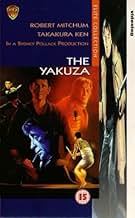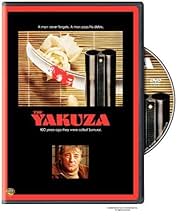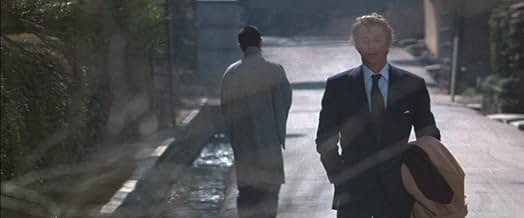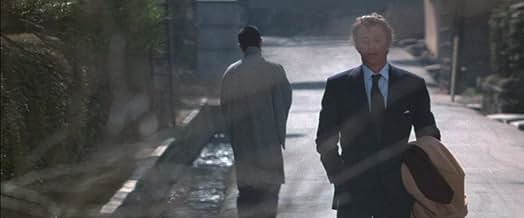CALIFICACIÓN DE IMDb
7.2/10
11 k
TU CALIFICACIÓN
El detective privado estadounidense Harry Kilmer regresa a Japón para rescatar a la hija secuestrada de un amigo de las garras de la Yakuza.El detective privado estadounidense Harry Kilmer regresa a Japón para rescatar a la hija secuestrada de un amigo de las garras de la Yakuza.El detective privado estadounidense Harry Kilmer regresa a Japón para rescatar a la hija secuestrada de un amigo de las garras de la Yakuza.
- Dirección
- Guionistas
- Elenco
Ken Takakura
- Ken Tanaka
- (as Takakura Ken)
Eiji Okada
- Toshiro Tono
- (as Okada Eiji)
Keiko Kishi
- Eiko Tanaka
- (as Kishi Keiko)
Kyôsuke Machida
- Jiro Kato
- (as Kyosuke Machida)
Eiji Gô
- Shiro 'Spider' Tanaka
- (as Go Eiji)
- Dirección
- Guionistas
- Todo el elenco y el equipo
- Producción, taquilla y más en IMDbPro
Opiniones destacadas
The strongest point of this film is the writing. It's the first Paul Schrader script ever to be filmed, written with his brother Leonard (who also worked with Paul on Blue Collar & Mishima) and Robert Towne (Chinatown, Marathon Man, Bonnie & Clyde). It seems we have the best of both Schrader's here; Leonard really understands the Japanese culture and Paul is a very cerebral and thematic writer who almost always raises a number of interesting issues.
The film, which is very respectful of it's foreign culture and tries to be as true as possible to it, first and foremost shows the differences between American and Japanese culture. However, there are so many themes in this movie though that it becomes tiresome to list them. The key ones include honor, loyalty, burden, duty, friendship, love, loss, obligation, and the differences between the men of pre and post war Japan.
Although Robert Mitchum was approaching 60 when made the film, he still possessed enough of his trademark grace to be credible enough against much younger men in the action scenes. He always exudes so much casualness and weariness, but his work here shows he was obviously fired up by the material.
The other standout actor is Ken Takakura. He plays an honorable man that everyone respects, but his honor and old ways also often make him intolerable to anyone around him. He hides the deep wounds of his character behind his stone face, but that doesn't in any way prevent him from conveys that he's a miserable man from another age who lives by his code but not for anything. As he's the native that used to be in the Yakuza and Mitchum is the gaijin that doesn't have to follow their honor system (although as the movie progresses, he subscribes to their codes and honor system more and more), Takakura gets to do all the skilled swordplay. His fighting won't thrill those who want a lot of stunts, but is great if you enjoy the psychology and strategy of the craft.
The film is it has a drab, low budget kind of look, mainly as a way to maintain the mood and tone of the piece. Some of the scenes really bring the material to life, particularly through some excellent camera work, but sometimes the look is indifferent and the soundtrack seems to be trying too hard. Aside from staying true to the material and getting strong performances, I wouldn't say that Sydney Pollack has done a great job here. This is not the kind of movie you watch if you are looking for John Woo action though, and for the most part the flaws are overshadowed by the strength of the script and performances. 8/10
The film, which is very respectful of it's foreign culture and tries to be as true as possible to it, first and foremost shows the differences between American and Japanese culture. However, there are so many themes in this movie though that it becomes tiresome to list them. The key ones include honor, loyalty, burden, duty, friendship, love, loss, obligation, and the differences between the men of pre and post war Japan.
Although Robert Mitchum was approaching 60 when made the film, he still possessed enough of his trademark grace to be credible enough against much younger men in the action scenes. He always exudes so much casualness and weariness, but his work here shows he was obviously fired up by the material.
The other standout actor is Ken Takakura. He plays an honorable man that everyone respects, but his honor and old ways also often make him intolerable to anyone around him. He hides the deep wounds of his character behind his stone face, but that doesn't in any way prevent him from conveys that he's a miserable man from another age who lives by his code but not for anything. As he's the native that used to be in the Yakuza and Mitchum is the gaijin that doesn't have to follow their honor system (although as the movie progresses, he subscribes to their codes and honor system more and more), Takakura gets to do all the skilled swordplay. His fighting won't thrill those who want a lot of stunts, but is great if you enjoy the psychology and strategy of the craft.
The film is it has a drab, low budget kind of look, mainly as a way to maintain the mood and tone of the piece. Some of the scenes really bring the material to life, particularly through some excellent camera work, but sometimes the look is indifferent and the soundtrack seems to be trying too hard. Aside from staying true to the material and getting strong performances, I wouldn't say that Sydney Pollack has done a great job here. This is not the kind of movie you watch if you are looking for John Woo action though, and for the most part the flaws are overshadowed by the strength of the script and performances. 8/10
I have to agree with the preponderance of viewers here who rate this as a neglected classic of the 70's. All aspects of the film - performances, script, and direction - raise this to the level of greatness. This is certainly among Mitchum's greatest performances - his subdued, world-weary toughness undergirds the movie. The story as has been noted, is a rich and multilayered one with a sadness that aspires to and quite nearly reaches the level of tragedy. It also must be noted that this is one of the most effective portrayals of Japanese culture on celluloid. The movie does not shrink from violence; the various scenes of assassination and slaughter could have been done by Peckinpah. The movie deserves a restoration and should be brought to tv in letterbox mode. (Are you listening, Turner Classic Movies?)
Not only is this a good 70's gangster/action flick, it is also one of the few movies about Japan ever produced in the States that does not make too many mistakes about Japanese culture.
Ken Takakura puts in a great performance which is no surprise since he first became famous in Japan for acting in yakuza (gangster) movies.
Anyone who has ever tried to understand or explain the concept of "giri" should see this movie!
Ken Takakura puts in a great performance which is no surprise since he first became famous in Japan for acting in yakuza (gangster) movies.
Anyone who has ever tried to understand or explain the concept of "giri" should see this movie!
Superb East-meets-West movie, I suspect largely due to Schrader's insight. Takakura Ken's performance really steals the show, though all actors are more than capable; Mitchum gives a great performance again. Not a martial arts movie, but contains a katana showdown that I can watch over and over again without finding fault [more believable than anything you'll see in 'Kill Bill'].
The story is gorgeously convoluted, keeping it's secrets to the very end, in a fitting Japanese manner. Action scenes are relatively restrained, and the story tells how Mitchum's character finally comes to understand Takakura Ken's character, and his apparently icy antagonism. When can we see a DVD copy?!
The story is gorgeously convoluted, keeping it's secrets to the very end, in a fitting Japanese manner. Action scenes are relatively restrained, and the story tells how Mitchum's character finally comes to understand Takakura Ken's character, and his apparently icy antagonism. When can we see a DVD copy?!
One of the best West-meets-East films made. Great dialogues, very realistic fighting scenes, even though this film has been made so long ago, without any CGI tricks at all, yet the sword fights still look really great. But in my opinion the story, which may be shortly described with one of the sentences spoken by Harry Kilmer (Robert Mitchum) at the end of this film: "I have destroyed his past, and his future" - perhaps the story is what it makes this film so unique and timeless. Outstanding performance by Ken Takakura ("Ken Tanaka")! If you haven't seen it yet - get it now! And why do I say "get it" instead of "rent it"? Because unfortunately VHS version available in US is more than 10 minutes shorter, and European VHS versions have even more *vital to the plot* cuts! (More info here: http://www.us.imdb.com/title/tt0073918/alternateversions
or if it doesn't work try the link under "Alternate versions"). Please: don't waste your time on those! I swear these edited versions must have been edited either by some blind and deaf personae, or a child who didn't understood plot at all! Currently the only good, somewhat true to the original theatrical print (just slightly more than 3 minutes shorter), are the 2hr long versions available on the not-so-legal (and not too good quality-wise) VCDs released in Hong Kong and Asia.
I rated this film very high - and I am not any big sword-actioneers fan, but nor is this movie any kind of sword fighting flicks. Its just a great story that is told (or actually shown) very well, and it deserves full 10/10.
or if it doesn't work try the link under "Alternate versions"). Please: don't waste your time on those! I swear these edited versions must have been edited either by some blind and deaf personae, or a child who didn't understood plot at all! Currently the only good, somewhat true to the original theatrical print (just slightly more than 3 minutes shorter), are the 2hr long versions available on the not-so-legal (and not too good quality-wise) VCDs released in Hong Kong and Asia.
I rated this film very high - and I am not any big sword-actioneers fan, but nor is this movie any kind of sword fighting flicks. Its just a great story that is told (or actually shown) very well, and it deserves full 10/10.
¿Sabías que…?
- TriviaMartin Scorsese wanted to direct after Calles peligrosas (1973), but the producers wanted Sydney Pollack. Scorsese is on record that he would very much have liked to direct the film and was disappointed that he was passed over. However, he got to direct Alicia ya no vive aquí (1974) instead after being sought out by Ellen Burstyn. "Alice" ended up making more than 20 times its budget and won Burstyn an academy award, while this film became a box office bomb.
- ErroresThe plane that Kilmer is boarding at the end is a Boeing 707; the one shown taking off in the last scene is a 727.
- Versiones alternativasFor the Spanish Castilian version all the dialogues were dubbed to Spanish, even the Japanese lines.
- ConexionesFeatured in ...Promises to Keep (1974)
Selecciones populares
Inicia sesión para calificar y agrega a la lista de videos para obtener recomendaciones personalizadas
- How long is The Yakuza?Con tecnología de Alexa
Detalles
Taquilla
- Presupuesto
- USD 5,000,000 (estimado)
- Tiempo de ejecución
- 1h 52min(112 min)
- Mezcla de sonido
- Relación de aspecto
- 2.39 : 1
Contribuir a esta página
Sugiere una edición o agrega el contenido que falta






























